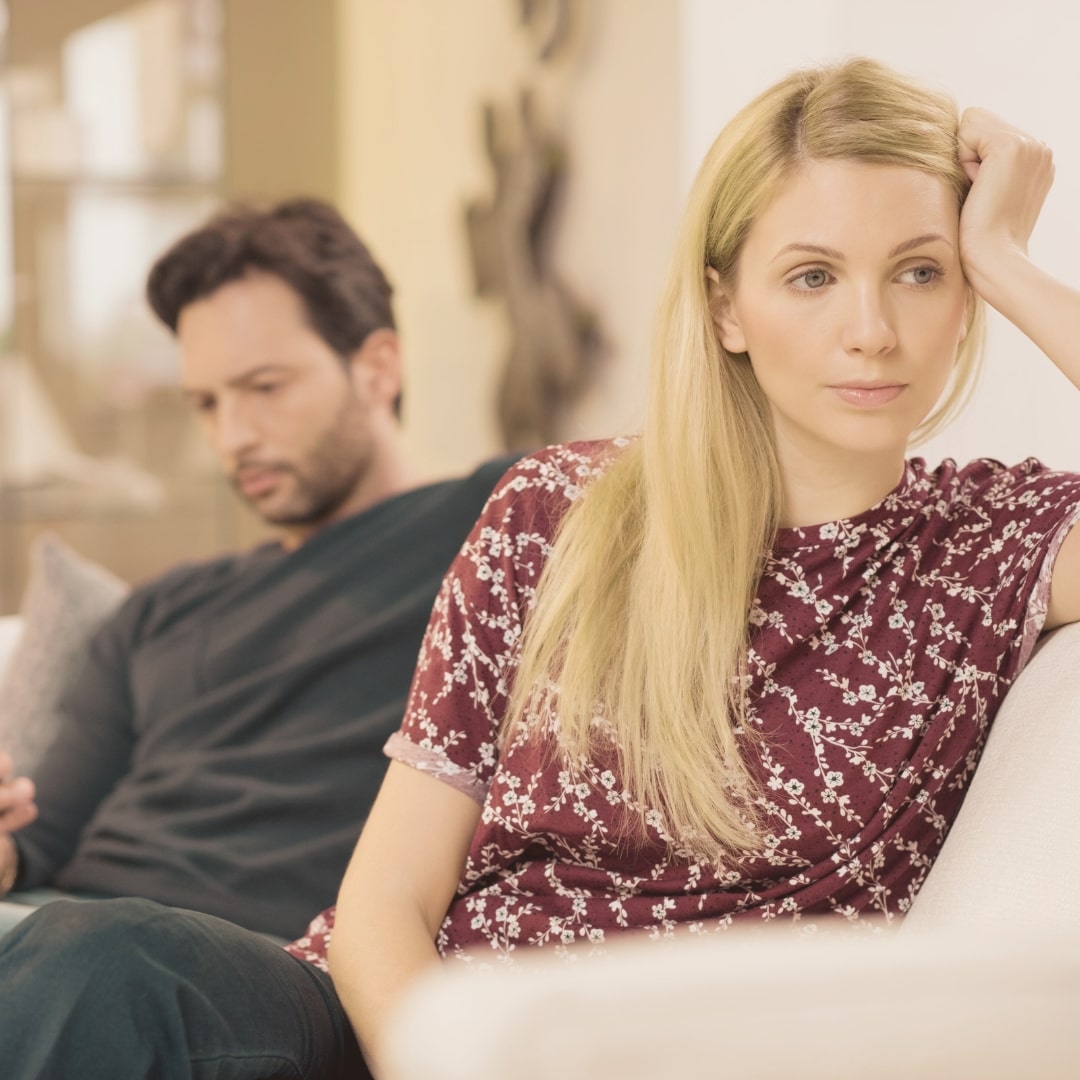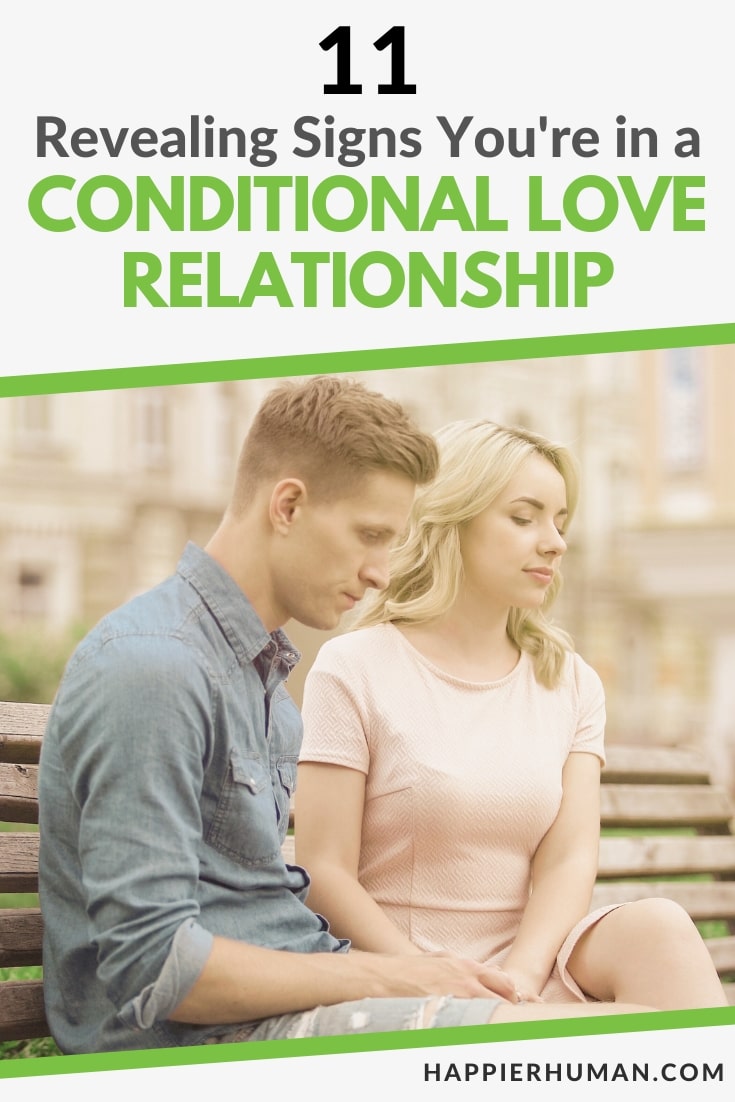From a young age, we learn that unconditional love is the standard, the ideal. It’s what we should strive for because that’s how Prince Charming loved Cinderella, how Aladdin loved Jasmine, and how The Prince loved Snow White.
Fairy tales, TV shows, movies, novels … all of them embody this concept of loving someone unconditionally, whether it’s the love a mother has for her child, the love between friends, or romantic love.
And conditional love is cast as unconditional love’s evil stepsister. But is being in a conditional love relationship bad? Can it be healthy? Or does it depend on your circumstances and living in the real world where we are fallible humans?
While my heart wants the Disney unconditional love, I’ve seen how beneficial loving someone conditionally can be and how toxic unwavering love can be.
But what are the signs you are in a conditional love relationship and is it still real love? Let’s find out.
What Is Conditional Love?
“I love you” may be the three most beautiful words to hear, but that love often comes with strings attached. This is known as conditional love.
It may seem like regular affection and love, but when you find the person who you love withholds their love because you haven’t met their needs, it becomes clear the love isn’t true and authentically given.
Instead, love is only given when specific conditions have been met by you.
Where “real” love or unconditional love feels amazing, since you know you are loved and adored without any reservations, limited love has an uncomfortable feeling, overshadowed by expectations.
You realize in time that the people who love you when life goes well actually love you conditionally.
It’s when the mango has hit the fan that you see who loves you unconditionally, and they will stand by you and continue to love you when you are not at your best. They love you unconditionally.
Conditional love isn’t always negative. When you are loved during certain conditions, it’s conditional love. As long as you are aware of what this relationship offers, you may still find benefit from “fair weather love”.
Some examples of conditional love are:
- “Take me to dinner and I will love you more.”
- “If you love me, you’ll come with me this weekend.”
- “You need to take a higher paying job if you want our relationship to work.”
Love that comes with an “if” is conditional. When you love someone conditionally, they are always a choice, which means they can go with option B. With unconditional love, there is no option B and no “if.”
How Does Conditional Love Differ From Unconditional Love?
There are various ways that loving a person conditionally is different from loving them unconditionally. However, unconditional love can be unhealthy if you think it means:
- You over-protect your loved one and become controlling.
- You love everything about your significant other when you only focus on the “good” and ignore the “bad” – often to your own detriment.
- You are and can be codependent and you’re responsible for each other’s happiness.
- You “complete” each other when you should be a whole person as you are and your partner should add to your life.
- You love your partner, no matter what they do, and you overlook unhealthy behaviors that harm you in any way.
That said, here are the main differences between conditional vs unconditional love.
With unconditional love:
- You and your partner are each other’s support network. You are always there for each other and wanting the best for each other.
- You know your partner and want them to grow, live authentically, and be the best version of themselves they can be.
- You don’t grow apart, not easily. And when you do feel like you are drifting apart, you put in the work to grow closer.
- You can be happy without your partner. They simply add to your joy, and while they are a source of your happiness at times, they don’t make or break you feeling happy.
- You can be your own person, live your truth, and know you are loved – always. You feel safe and accepted.
- Love is given freely with no ifs or buts.
With conditional love:
- You experience irregular expressions of love, causing you to doubt whether your partner actually loves you. Your partner may even withhold love to punish you for something you did or they perceive you did.
- Love comes with strings attached. “I love you … when you … but … if …”
- Your partner wants to change you, they don’t trust you, and they don’t have your back.
- You feel like you have to earn your partner’s love or do something in exchange for it. Love is not given freely.
- There are often disagreements and arguments, but instead of tackling problems like a team where it’s us vs the problem, it’s a you vs me problem.
Why Is It Challenging to Be in a Conditional Love Relationship?
The challenge depends on your personal perspective. Conditional love is a lot more common than unconditional love, purely because it isn’t easy to love someone wholeheartedly and in a healthy way.
Unconditional love can be easier when you and your loved one are soulmates or soul friends.
Not every limited love relationship, however, is challenging. It may work for you and your partner, provided you have a strong relationship foundation, you both want the best for each other, and you set and maintain healthy boundaries.
If you are clear about your deal breakers, then your relationship can be good with the usual ups and downs – because nothing is moonshine and roses 100% of the time.
When your relationship is unhealthy or toxic, it doesn’t really matter what kind of love you and your significant other share, right? And perhaps, there is no “real” love between you.
An unhealthy conditional love relationship can be challenging when it:
- Results in emotional instability and insecurity where your feelings aren’t validated, you feel insecure, and you doubt yourself and your partner
- Becomes a transactional relationship, where you must earn any affection and “love” by doing and giving (often against what you feel comfortable with)
- Causes you to feel less than, like you aren’t enough (and never will be), and that you aren’t worthy of genuine love and affection
- Results in a lot of conflict, disrespect, and feelings of mistrust, contempt, helplessness, frustration, loneliness, and anger
- Results in abuse, whether that’s mental, emotional, verbal, spiritual, or physical
Is a Conditional Love Relationship Still a Real Relationship?
When you and your partner love each other conditionally, you can be in a real relationship. A romantic relationship between two people can be healthy or unhealthy, or even a mix of these characteristics.
And the fact that you don’t share unconditional love doesn’t make your relationship any less real – whether you are both happy with and in the relationship or not.
Of course, it would be ideal if your “fair weather love” encourages you to embody values we associate with unconditional love:
- Self-develop and growth
- Live authentic lives
- Meet your needs
- Have clear boundaries and expectations
- Make your relationship work for you
- Be your own person
- Share mutual trust and respect for each other
- Take accountability for your actions in the relationship
You can also love the person unconditionally but conditionally love how they behave.
That simply means that you don’t accept unhealthy behaviors that aren’t good for your mental or physical health, ensuring that you self-love and self-care and put yourself first too (without being selfish).
So you don’t allow your partner to walk all over you and treat you like a floor rag.
11 Signs you’re in an Unhealthy Conditional Love Relationship
The real challenge is when your restrictive love relationship becomes unhealthy. A healthy conditional relationship is clear about who plays what part, and it’s equal.
When things go off course, it can become truly toxic, and here are some of the signs that your conditional connection has turned sour.
1. There’s a Lack of Support
Even conditional relationships can offer support. When that support dries up or becomes one-sided, it can indicate your relationship is unhealthy (in addition to being conditional).

When you feel like you’re not being supported, it signals your partner’s conditions are selfish and extreme.
Ensure you talk to someone about these feelings as having an unsupportive partner can be psychologically damaging and cause you to not feel like you are good enough.
2. You Feel Less Than
You should be the only one who works on your ego, but in a relationship, your partner’s love builds your sense of self.
If your relationship has unhealthy limited love, it leaves you feeling inadequate. You’re less than good enough for your partner, and soon, you can believe you suck at everything, including life.
Ensure you have people around you to balance out the unhealthy conditions and love you for who you are. If the unhealthy relationship has extreme expectations, it may be time to consider getting out.
3. Trust Flew Out the Window
Without trust, we can’t have a successful or healthy relationship. Your “fair weather love” relationship can work if you still trust each other to have your best interests at heart.
If you realize you can’t trust your partner, and that they are being selfish and don’t want the best for you, it’s clear that you are in an unhealthy relationship.
Your partner should still have regard for you, even if it’s conditional at times. If they continually disregard you, it’s time for a change.
4. “It’s Me. I’m the One to Blame.”
Like the hit song, if you feel like you’re always being blamed for everything, you’re in an unhealthy and highly conditional relationship.
Needless to say, being constantly blamed for everything (including the cat getting pregnant or the Dodgers losing), you are with a toxic partner whose love is so conditional you feel like you’re always failing.
Relationship issues become your fault, and growth is more about your partner than about you as a team when they withhold love to punish you.
Included in this sign is when your partner keeps a running scoresheet of all the times you failed or messed up. They don’t love you as they are in competition with you.
5. Communication Is a War Zone
Communicating with your partner who only gives you conditional health (and a huge helping of judgment and criticism) can be like walking through a minefield.
One misstep and your toast. You feel anxious about discussing your feelings, and you never know when they will launch an aerial assault with hefty conditions to give you love.

Conversations are extra careful, and you feel like you’re on eggshells all the time when your love is limited to specific situations.
Instead of really connecting, you feel like you’re sending Morse code to your partner, and you fear misinterpreting their responses.
6. You Are Constantly Being Judged
Even in conditional relationships, both partners can offer each other a space where they feel accepted. Yet, when unhealthy conditions are applied, it can make you feel like you’re facing an impossible mountain to climb.
Imagine having a partner who constantly looks you over like a bug, never sees good in what you do, and tells others how you are a failure. That’s painful and not productive for you at all.
Stories will get back to you, and soon, you’ll be too afraid of doing anything your partner may judge (such as wearing clothes they’ve criticized on others or going to the gym when they aren’t into fitness).
Feeling like they are constantly weighing you up can lead to you becoming fearful of your partner.
7. There’s No Give in Them
A healthy relationship is about giving and taking. An unhealthy limited love is not about love, it’s about taking, all the time. When you are talking with them, they will argue against your points as if their lives depended on it.
For this partner, it’s about being right, all the time, no matter how that affects you. Compromise and negotiation doesn’t exist in their world.
8. You Get Loads of Affection When Others Are Around
Your partner acts like you’re the perfect couple when you’re surrounded by friends and family or attending a work event.
They shower you with love and affection, holding your hand, giving you kisses on the cheek, bringing you snacks and your favorite drink, and dancing closely with you.
You may even fall for this act – after all, your partner is the perfect significant other when you're out and about (because there’s an audience). But that all ends the moment when you are alone, whether in your house, for the drive home, or outside the venue.
They are a whole different person, withholding love or wanting something in return for the affection they had to show you.
This behavior isn’t normal, and it’s a sign that they love you conditionally while feeling the need to maintain appearances to make them look good to others.
9. The High and Mighty Partner
Toxic conditional partnerships usually result in your partner lording over you and making as if they know best.
Instead of your partner supporting your growth, they actively hold you back by moving the goal line and making you feel like you never reach their dreams. You’re just not good enough to be loved – according to them.
If you manage to reach the unachievable heights that they set you, they will love and praise you, but this is ultimately unsustainable for you.
Living up to the unrealistic isn’t going to last. Instead, your partner should see you for you, set the goals within reach (and with your participation), helping you achieve more.
10. The Sight of Them Poisons You
When your partner passes you or when you see them, it should make you feel happy and content.
However, if your partner passes you in the kitchen and you cringe or you feel anxious, you are with a toxic partner whose very presence poisons you.

You dread seeing your partner, and you’ll rather work overtime or hang out at a bar before going home.
They aren’t the love of your life and you don’t feel safe around them, but you stay because they moderate their waspish behavior with conditional love challenges.
11. You Feel Insecure About Your Relationship
It’s easy to feel insecure about who you are, your partner, and your role in the relationship when you are loved conditionally. You never know when the love your significant other feels for you is going to run out or whether they actually love you.
You’re always questioning why they keep you around, what value you add to the relationship, and what they see in you.
Living like this is no way to really live. It’s stressful and causes your mental health to deteriorate because you go out of your way to keep them happy and to love them with no reciprocity.
While some insecurity in a relationship is normal, whether it’s based on healthy restrictive love or unconditional love, feeling so unconfident and unsure about your relationship isn’t healthy.
Final Thoughts on Being in a Conditional Love Relationship
It’s so easy to assume that conditional love is a bad thing and strive for unconditional love.
But limited love can benefit a relationship when you and your partner are on the same page about your roles and what you mean and do for each other. There’s a measure of give and take.
But a “fair weather love” relationship can easily become unhealthy. In this relationship, your significant other gaslights you, explicitly dotes on you when others are around and treats you like nothing or trash when you’re alone with them, and judges you.
You feel drained, you walk on eggshells around them, and you never know what’s up. You can’t help but wonder, “Will they be loving today or not?”
If you’re in a toxic relationship, you have to decide whether it’s worth staying or better to go. Read about the life-saving benefits to ending a toxic relationship, and decide what’s best for you.
And if you want more resources on building healthy relationships or recovering from a bad one, check out these blog posts:
- 5 Reasons to Stop Chasing People and Relationships
- 6 Steps to Stop Worrying About Your Relationship
- 20 Ways to Get Over Someone You Love & Move On


